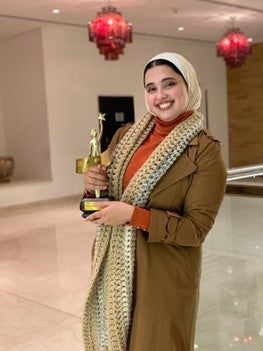From where I stand: “Winning first place was proof that I can excel and achieve great results”
Date:

Toka Mohamed, 23, was among a group of 20 women who took part in UN Women’s photography training. After jumping between unfulfilling short-term jobs, she decided to pursue her passion to become a professional photographer and videographer.
“After graduating from University, I worked in several administrative and sales positions. However, I didn’t find myself in any of them, mainly because I wasn’t interested in these fields.
I always had a hidden passion for photography that I’d never had the chance to enrich. I used to take landscape photos and portraits for my friends as a hobby, and sometimes I would do some freelance work for weddings and engagement parties for friends and family.
Nonetheless, my knowledge and experience were limited at the time. That’s why I was intrigued when I learned about the photography training offered by UN Women.
Through the training, I gained a lot of knowledge about photography and learned more about lighting and indoor shooting. To my surprise, the training wasn’t only about photography. I was also selected to join a training on videography, which I discovered that I love even more. Learning the basics of videography and filmmaking has widened my horizons tremendously.
I also had the opportunity to practice my photography skills and observe what I’d learned about videography be applied first-hand when I was hired as a freelance photographer to shoot the ‘behind the scenes’ of a movie. It was my first time on-set in a shooting location, and my interactions with the director, videographers, cinematographers and everyone on location were invaluable.
I also had the chance to join a documentary competition organized by UN Women, which added more experience to my portfolio and learn about the other roles in video production, including directing and editing. It was an extremely eye-opening experience. I cannot describe how ecstatic and proud I was when our documentary won. Winning first place was proof that I can excel and achieve great results.
What was equally invaluable about the training was the wide network I established with my fellow participants and instructors. We still share training and job opportunities. Through this network, I was hired to cover the photography and videography of a local competition award ceremony and I’m confident that I will be exposed to more opportunities [that would enrich my career].
After discovering my love for filmmaking, I want to focus on video production and work my way up to becoming a film producer. I dream that one day I’ll create powerful content focused on women’s issues.”
The photography training Toka joined was part of a wider set of creative industry trainings delivered by Arascope, in cooperation with Media-Arts for Development. It falls under the regional joint programme “Promoting Productive Employment and Decent Work for Women in Egypt, Jordan and Palestine,” which is implemented by UN Women and the International Labour Organization, in partnership with the National Council for Women and the Ministry of Manpower, with the support of the Swedish International Development Agency.
Through these trainings, 100 distinguished women trainees received internship opportunities. In addition, Toka was among 30 selected trainees who were divided into teams that produced three women-led documentaries for a competition portraying stories through women’s eyes. The documentaries have also been submitted to the upcoming edition of the Aswan International Women Film Festival.
Toka’s story shows how providing women with opportunities and a strong network to facilitate their career development and reduce the proportion of youth not in employment, education or training is directly linked to achieving SDG 5 on gender equality and SDG 8 on decent work and economic growth.